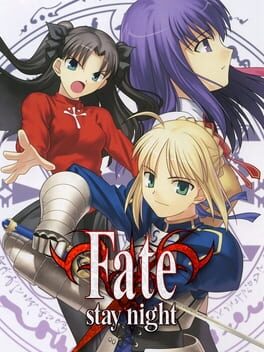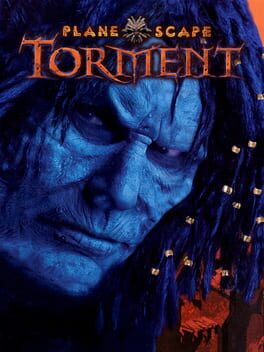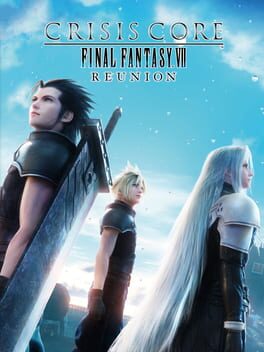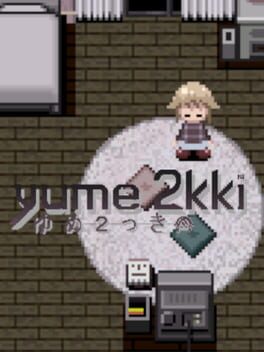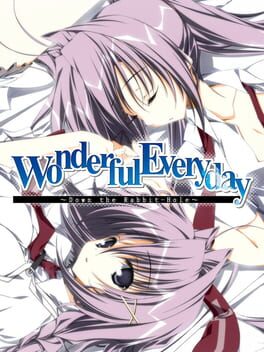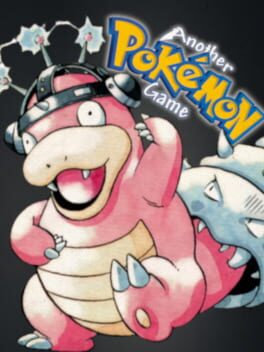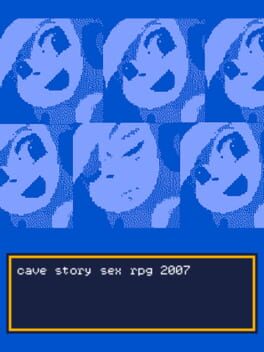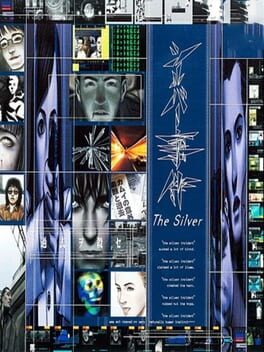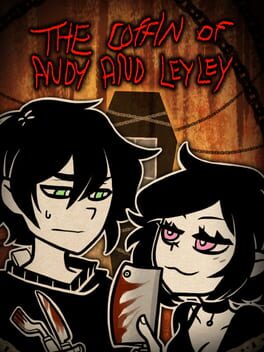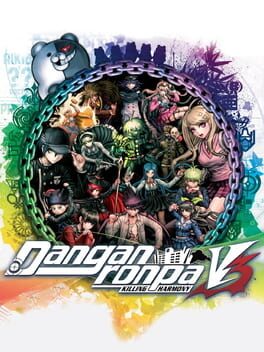Ringtomb
167 Reviews liked by Ringtomb
Fate/Stay Night
2004
Planescape: Torment
1999
Critics: "This game is a masterpiece. A master class in non-linear storytelling. A deep, moving, intelligent exploration of memory and identity. One of the best examples in the medium's history of game-as-art and game-as-literature."
[boots up game]
Floating Skull With Thick New York Accent: "What's crackin', chief? You dead or sumthin'? Let's skedattle outta here before those mummies get a whiff of us, or our ass is grass if ya know whadd I mean!"
[boots up game]
Floating Skull With Thick New York Accent: "What's crackin', chief? You dead or sumthin'? Let's skedattle outta here before those mummies get a whiff of us, or our ass is grass if ya know whadd I mean!"
Final Fantasy VII
1997
within a span of two months, from september to november of 2019, i lost an old friend and former lover to bone cancer at 23 years old, and my father revealed to me that he’d been diagnosed with stage 2 lung cancer. this would indicate a nearly three year journey to where i am now - a sequence of events which tested the limits of my perseverance, willpower, camaraderie, self-love, and actualization of community. my life underwent severe changes throughout this period; essentially revising my entire outlook on my relationships to patching up and mending my relationship with my dad which had resulted in some pretty catastrophic gaps gashed out pretty equally on both sides. some outside events completely reformed how i lived, the safety and love i had to provide myself for my own wellbeing, and fostering a lot of growth and evolution out of a patch where what i’d known and what i held onto were slipping through my fingers.
during this time, my father set an example of how he would choose to live. he combatted cancer and heartbreak with rudiment, structure, dedication and iron will. i watched him break on more than a few occasions. but it was through his search for that light where he found his own branch of buddhism, practice of meditation, and a new outlook on his life. he began to teach me the lessons he’d taken away - both of us being that type of person with loud, constantly-spewing minds. he instilled and internalized the idea that meditation and serenity are not about clearing the mind of thought, but finding a means to acknowledge the thought and move on from it. it was only along the lines of that practice that we both began to unbox our trauma - both conjoined and individual. it was only then when we could cultivate growth, hope, and those first rays of light.
i had no access to therapy or professional help at the time. i was between jobs when i wasn't crammed into ones that abused and berated me and my time. my greatest resources for self-love, as they are now, were my loved ones and my then-cracked-yet-unbroken devotion to art. traumatic attachments kept me apart from those things i loved most, but in the process of recovering from a sequence in time in which i felt like i’d lost myself, figured it took recessing back to those works which had so clearly defined attics of my life to that point to regain shards of who i’d been, and define who i would choose to be moving forward. over the next year, i would play final fantasy vii six times to completion, twice with friends, four times on my own. the hanging threads of grief, trauma, self-actualization v. dissociation, lack of direction - these things culminated in a story which more and more i felt whispered answers directly to me, for my consumption alone. it’s in those moments where a bond is made between art and audience where the attachment becomes not just inseparable, but near essential.
final fantasy vii doesn’t hand you answers for the questions you come to it with. there isn’t a resolution to the trauma, there isn’t a solution to the pain or the grief. it is an embrace, and a hold of the hand, and a gentle call; “here is how you live with yourself. here is how you learn to be alive again.” the sociopolitical conflicts, the internal struggles, the budding seeds of affection and fraternity don’t reach a natural apex - they hum in anticipation of a deciding factor which never comes. perpetually trapped within the question, but offering you the means to provide your own answer in life. the final shot of the game isn’t a conclusion meant to be expanded upon. it’s simply a closing of the cover, the final page turned before the index of note paper before being passed to you with the command - “apply yourself. turn this into something that matters.” so i chose to.
and i found myself in midgar again, with new friends and a new outlook.
you come back to the slums of wall market and sector 7 with a new worldview and appreciation each time. there’s a different purpose, when your relationship with this game is as intimate as mine, for coming back here. i know the smog, the street life, the feeling of inescapable, walled-in urban destitution well. you grow up in any city poor enough and you get to know midgar intimately. it’s a familiar setting with a familiar social agency. the seventh heaven crew, they’re all faces i’ve known, fires in bellies i once shared, and now understand in a different light. they’re old friends i knew in my activism years as a teenager, they’re people i looked up to and lost through the years. i’ve lost a lot of people and a lot of faith over time. it might seem like a quick moment to many but the sector 7 tower fight reminds me of people and things that exist only in memories now.
the moment the world opens up and the main theme plays, while unscripted, is one of the most powerful in the game to me. i retain that this title track might be my favorite piece of video game music and such a perfect encapsulation of the game’s philosophy and emotional core. stinging synth strings meet acoustic woodwind and orchestral drones. playful countermelodies give way to massive, bombastic chords in a rocking interplay that rarely fails to inspire, intrigue and invoke. uematsu-sensei, unquestionably at the apex of his mastery here, provides his most timeless score. i think about, am inspired by, and draw from his work here intensely. the artistry pours out from every nook of final fantasy vii - the models, the cutscenes, the background renders, the gameplay systems, the story, the use of diegetic sound, the pacing, the designs - everything came together in a way that somehow evokes equal feelings of nostalgia, futurism, dread, fear, warmth, love, hope, and utter timelessness. streaming and voice-acting this entire game with my close friends was one of the best experiences of my year. hitting each turn with a decently blind audience provided both knowing and loving perspective and the unmitigated rush of first experience - in tandem, a passing of the torch, an unspeakable gift of an unbroken chain shared between loved ones. if final fantasy vii saved my life once before, this was the run which restored its meaning and direction.
i’ve been cloud, i’ve been tifa, i’ve been barret, i’ve been nanaki. i’ve been zack, i’ve been aerith. there are lives lived in the confines of final fantasy vii which i hold as pieces of my own, countless repetitions of those stories with those resolutions my own to meet, different each time. there was something magic about the ability to, a year after that painful strike of all of that anguish, that death, that loss, that fear, sit on the end screen as the series’ endless “prelude” played amongst 32-bit starfields and openly sob for a half hour surrounded by the voices and words of my loved ones. that was the day i learned to live again. it’s more than a game when you know it this intimately. it’s more than an experience when you share these scars. it’s more than art when you hold onto so dearly. there isn’t a classifier for what final fantasy vii means to me other than, “a lot”. sometimes, less is more. i don’t have a conclusion beyond that for you. the experience recalls everyone and everything i've ever loved and lost, and all that i've come to gain and hold dear. goodbye to some, hello to all the rest. true, reading this, it may have been a waste of your time, but i’m glad i was able to share this with someone. i hope this reaches at least one of you on a level you needed today, or maybe it invokes something in you about something you love so dearly. i’m here to tell you - this is how i learned to live again. if you need someone to tell you, today, that you can too, here it is. you aren’t alone. go find those answers for yourself.
please don't step on the flowers on your way.
during this time, my father set an example of how he would choose to live. he combatted cancer and heartbreak with rudiment, structure, dedication and iron will. i watched him break on more than a few occasions. but it was through his search for that light where he found his own branch of buddhism, practice of meditation, and a new outlook on his life. he began to teach me the lessons he’d taken away - both of us being that type of person with loud, constantly-spewing minds. he instilled and internalized the idea that meditation and serenity are not about clearing the mind of thought, but finding a means to acknowledge the thought and move on from it. it was only along the lines of that practice that we both began to unbox our trauma - both conjoined and individual. it was only then when we could cultivate growth, hope, and those first rays of light.
i had no access to therapy or professional help at the time. i was between jobs when i wasn't crammed into ones that abused and berated me and my time. my greatest resources for self-love, as they are now, were my loved ones and my then-cracked-yet-unbroken devotion to art. traumatic attachments kept me apart from those things i loved most, but in the process of recovering from a sequence in time in which i felt like i’d lost myself, figured it took recessing back to those works which had so clearly defined attics of my life to that point to regain shards of who i’d been, and define who i would choose to be moving forward. over the next year, i would play final fantasy vii six times to completion, twice with friends, four times on my own. the hanging threads of grief, trauma, self-actualization v. dissociation, lack of direction - these things culminated in a story which more and more i felt whispered answers directly to me, for my consumption alone. it’s in those moments where a bond is made between art and audience where the attachment becomes not just inseparable, but near essential.
final fantasy vii doesn’t hand you answers for the questions you come to it with. there isn’t a resolution to the trauma, there isn’t a solution to the pain or the grief. it is an embrace, and a hold of the hand, and a gentle call; “here is how you live with yourself. here is how you learn to be alive again.” the sociopolitical conflicts, the internal struggles, the budding seeds of affection and fraternity don’t reach a natural apex - they hum in anticipation of a deciding factor which never comes. perpetually trapped within the question, but offering you the means to provide your own answer in life. the final shot of the game isn’t a conclusion meant to be expanded upon. it’s simply a closing of the cover, the final page turned before the index of note paper before being passed to you with the command - “apply yourself. turn this into something that matters.” so i chose to.
and i found myself in midgar again, with new friends and a new outlook.
you come back to the slums of wall market and sector 7 with a new worldview and appreciation each time. there’s a different purpose, when your relationship with this game is as intimate as mine, for coming back here. i know the smog, the street life, the feeling of inescapable, walled-in urban destitution well. you grow up in any city poor enough and you get to know midgar intimately. it’s a familiar setting with a familiar social agency. the seventh heaven crew, they’re all faces i’ve known, fires in bellies i once shared, and now understand in a different light. they’re old friends i knew in my activism years as a teenager, they’re people i looked up to and lost through the years. i’ve lost a lot of people and a lot of faith over time. it might seem like a quick moment to many but the sector 7 tower fight reminds me of people and things that exist only in memories now.
the moment the world opens up and the main theme plays, while unscripted, is one of the most powerful in the game to me. i retain that this title track might be my favorite piece of video game music and such a perfect encapsulation of the game’s philosophy and emotional core. stinging synth strings meet acoustic woodwind and orchestral drones. playful countermelodies give way to massive, bombastic chords in a rocking interplay that rarely fails to inspire, intrigue and invoke. uematsu-sensei, unquestionably at the apex of his mastery here, provides his most timeless score. i think about, am inspired by, and draw from his work here intensely. the artistry pours out from every nook of final fantasy vii - the models, the cutscenes, the background renders, the gameplay systems, the story, the use of diegetic sound, the pacing, the designs - everything came together in a way that somehow evokes equal feelings of nostalgia, futurism, dread, fear, warmth, love, hope, and utter timelessness. streaming and voice-acting this entire game with my close friends was one of the best experiences of my year. hitting each turn with a decently blind audience provided both knowing and loving perspective and the unmitigated rush of first experience - in tandem, a passing of the torch, an unspeakable gift of an unbroken chain shared between loved ones. if final fantasy vii saved my life once before, this was the run which restored its meaning and direction.
i’ve been cloud, i’ve been tifa, i’ve been barret, i’ve been nanaki. i’ve been zack, i’ve been aerith. there are lives lived in the confines of final fantasy vii which i hold as pieces of my own, countless repetitions of those stories with those resolutions my own to meet, different each time. there was something magic about the ability to, a year after that painful strike of all of that anguish, that death, that loss, that fear, sit on the end screen as the series’ endless “prelude” played amongst 32-bit starfields and openly sob for a half hour surrounded by the voices and words of my loved ones. that was the day i learned to live again. it’s more than a game when you know it this intimately. it’s more than an experience when you share these scars. it’s more than art when you hold onto so dearly. there isn’t a classifier for what final fantasy vii means to me other than, “a lot”. sometimes, less is more. i don’t have a conclusion beyond that for you. the experience recalls everyone and everything i've ever loved and lost, and all that i've come to gain and hold dear. goodbye to some, hello to all the rest. true, reading this, it may have been a waste of your time, but i’m glad i was able to share this with someone. i hope this reaches at least one of you on a level you needed today, or maybe it invokes something in you about something you love so dearly. i’m here to tell you - this is how i learned to live again. if you need someone to tell you, today, that you can too, here it is. you aren’t alone. go find those answers for yourself.
please don't step on the flowers on your way.
Yume 2kki
2007
I think, above all else, what makes Yume 2kki stand out as unique in not just RPG Maker games, or even just video games, but media in general, is how it still manages to impress years after its release. For all that I appreciate about my other favorite games, including those that so obviously inspired 2kki, none have managed to continuously leave me speechless so long after I initially played it like this free indie game has. If games are art, Yume 2kki is a canvas the size of the Louvre.
The fact that 2kki advertises itself as a mere fan sequel to Yume Nikki is an ultimate understatement. To be clear, Yume Nikki is fantastic, it's a 10/10 classic, and it’s an arguably equal game to 2kki. That said, it’s still a cute little hour-long experience that’s fun to drop into from time to time in order to immerse yourself in its vibrancy and its melancholy. 2kki is a monster. Yume Nikki fans can easily count all of its worlds; I’m not sure if anyone has ever experienced all of 2kkis worlds. Yet Yume 2kki, even with its massive amount of locations, would be considered like any other fan game if it just stopped there, but what makes the game stand out is that it just keeps going. Yume Nikki games stop when the player obtains all of the effects, but in this one, that’s when the game really gets started. Collecting wallpapers and menu themes, and digging as deep as possible for the most obscure worlds and events is what really turns this game from a fantastic tribute to something all of its own, completely enjoyable as its own experience and even more impressive as a tribute to Yume Nikki and its community.
It's no secret that this game’s range of quality varies wildly from world to world. That’s naturally going to be the case with this type of game. Some moments will feature some of the best pixel art and dark ambient music you’ll ever hear, the next world will look like a 10 year old’s MS Paint portfolio, but I can’t help but feel that even these utterly mediocre worlds serve as a bonus to the overall experience. Despite a lack of artistic ability in some of these areas, they’ll often simultaneously feature a lot of great ideas (see the Dream Park), and help further establish Yume 2kki as a passion project of passion projects.
Even if these stylistically lesser worlds bother you, that shouldn’t take away from the best this game has to offer, which goes far above and beyond what any other Yume Nikki game, dream simulator, or “walking simulator” has to offer. Any vein of worlds made by qxy or wataru fit nicely within this category. It’s so easy to jump to my favorite section of this game, the path to Lavender Waters, which provides such bittersweetness yet bliss as the player goes deeper and deeper into its worlds. It feels like it’s own game entirely, yet it, and qxy’s other worlds perfectly showcase 2kki’s mix of emotions. Traveling through the Cotton Candy World, the player can continue into the surreal loveliness that world has to offer, but they may find themselves drifting into the horrors beyond the surface. I’ve never been outright terrified playing Yume 2kki, but the ways that horror works itself into areas one wouldn’t expect made those few horrific moments stand out (see the Infinite Library and Static Noise Hell for my favorite examples of this).
Most importantly though, these sudden moments of horror call back to 2kki’s crowning achievement: no other game quite recreates dreams and nightmares in the way that this game has. Most dream simulators are limited in the sense that they often simulate the dreams of its small team of developers, maybe even just one person. So it shouldn’t be a surprise that 2kki’s state of being as a free, international, community-led project has led to a far wider, more realistic portrayal of dreams. The only other game that comes even close is the relatively new B3313, fittingly another community led, free project. Even that game only goes so far though. Yume 2kki really takes RPG Maker to its limits. The engine itself has often been viewed as an outlet for the independent developer, writer, musician, or artist, and in that sense, 2kki is an even more accessible outlet, by already giving developers the game’s defined mechanics and just letting them explore.
To be fair though, so many dream simulators don’t even really try to accurately simulate the average dream. Take the original Yume Nikki, for example. That experience serves less as a simulator of dreams, and more of an open window into a tortured mind. Yume Nikki tells a story, and that makes it a different beast entirely from Yume 2kki, which has no greater story to tell (realistically, most Yume Nikki fangames come with a clear story to decipher). To call 2kki’s symbolism and exploration meaningless would be a flawed perspective, though. Again, Yume 2kki is a canvas for the surrealist, and ultimately, these developers have their own story to tell. It’s as if a character and a world were presented to a room of writers, and every one of them then crafted their own wildly different, yet similar stories out of them.
Still though, 2kki doesn’t really have a main plot, and much like Yume Nikki, all of the endings are very short. A short ending isn’t too big of a deal in a short game, but after spending maybe 30 to 40 hours getting 95% of the wallpapers for 2kki’s final ending, only for it to be a 30 second abstract scene, might hit players the wrong way. The same might be the case regarding how obtuse the exploration can be sometimes. Realistically, the 2kki wiki is a requirement to complete the game, and it’s a great wiki. I find exploring the website to be akin to some kind of treasure map, especially when there’s a menu theme or a cool wallpaper attached at the end, but some might find a constant referral back to the wiki to take them out of the immersion. Neither of these issues bother me too much, what my main issue tends to be is that some worlds are just a bit too convoluted for their own good. Sometimes, great art can get in the way and make worlds actively harder to navigate through, and other worlds just boil down to massive mazes that are easy to get frustrated by without, again, a constant referral back to the wiki. Far from a dealbreaker for me, obviously, though it does turn some potentially fantastic locations toward mediocrity.
For more or less two and a half years, Yume 2kki has been my go-to video game. It stands out so clearly among a sea of open world games where areas are virtually indistinguishable from each other. There’s still so much to discover, too, and many of my favorite discoveries only came in the form of updates from the last year or so. It may seem like I talked about a few worlds, but I didn’t even talk about the perspective shifting areas, if you know you know. You can’t really go wrong with at least trying out Yume 2kki. Knowledge of Japanese isn’t really needed at all in order to play, and there are so many different methods of playing through the game, whether you view it as a collectathon, or just something to blindly fire up once in a while and wander around. I’ve never stopped loving RPG Maker games, but over the last month, I’ve been looking at some RPG Maker horror games I never played before, reaffirming my love for this niche of gaming. That said, nothing I’ve played comes even close to Yume 2kki (or Yume Nikki). It’s a joy coming back to these games and realizing there’s so much more to discover, though it’s a bit melancholic all the same knowing that there’s likely no game in this field that will reach the level of ambition, community support, or raw artistry of Yume 2kki.
tldr: good.
The fact that 2kki advertises itself as a mere fan sequel to Yume Nikki is an ultimate understatement. To be clear, Yume Nikki is fantastic, it's a 10/10 classic, and it’s an arguably equal game to 2kki. That said, it’s still a cute little hour-long experience that’s fun to drop into from time to time in order to immerse yourself in its vibrancy and its melancholy. 2kki is a monster. Yume Nikki fans can easily count all of its worlds; I’m not sure if anyone has ever experienced all of 2kkis worlds. Yet Yume 2kki, even with its massive amount of locations, would be considered like any other fan game if it just stopped there, but what makes the game stand out is that it just keeps going. Yume Nikki games stop when the player obtains all of the effects, but in this one, that’s when the game really gets started. Collecting wallpapers and menu themes, and digging as deep as possible for the most obscure worlds and events is what really turns this game from a fantastic tribute to something all of its own, completely enjoyable as its own experience and even more impressive as a tribute to Yume Nikki and its community.
It's no secret that this game’s range of quality varies wildly from world to world. That’s naturally going to be the case with this type of game. Some moments will feature some of the best pixel art and dark ambient music you’ll ever hear, the next world will look like a 10 year old’s MS Paint portfolio, but I can’t help but feel that even these utterly mediocre worlds serve as a bonus to the overall experience. Despite a lack of artistic ability in some of these areas, they’ll often simultaneously feature a lot of great ideas (see the Dream Park), and help further establish Yume 2kki as a passion project of passion projects.
Even if these stylistically lesser worlds bother you, that shouldn’t take away from the best this game has to offer, which goes far above and beyond what any other Yume Nikki game, dream simulator, or “walking simulator” has to offer. Any vein of worlds made by qxy or wataru fit nicely within this category. It’s so easy to jump to my favorite section of this game, the path to Lavender Waters, which provides such bittersweetness yet bliss as the player goes deeper and deeper into its worlds. It feels like it’s own game entirely, yet it, and qxy’s other worlds perfectly showcase 2kki’s mix of emotions. Traveling through the Cotton Candy World, the player can continue into the surreal loveliness that world has to offer, but they may find themselves drifting into the horrors beyond the surface. I’ve never been outright terrified playing Yume 2kki, but the ways that horror works itself into areas one wouldn’t expect made those few horrific moments stand out (see the Infinite Library and Static Noise Hell for my favorite examples of this).
Most importantly though, these sudden moments of horror call back to 2kki’s crowning achievement: no other game quite recreates dreams and nightmares in the way that this game has. Most dream simulators are limited in the sense that they often simulate the dreams of its small team of developers, maybe even just one person. So it shouldn’t be a surprise that 2kki’s state of being as a free, international, community-led project has led to a far wider, more realistic portrayal of dreams. The only other game that comes even close is the relatively new B3313, fittingly another community led, free project. Even that game only goes so far though. Yume 2kki really takes RPG Maker to its limits. The engine itself has often been viewed as an outlet for the independent developer, writer, musician, or artist, and in that sense, 2kki is an even more accessible outlet, by already giving developers the game’s defined mechanics and just letting them explore.
To be fair though, so many dream simulators don’t even really try to accurately simulate the average dream. Take the original Yume Nikki, for example. That experience serves less as a simulator of dreams, and more of an open window into a tortured mind. Yume Nikki tells a story, and that makes it a different beast entirely from Yume 2kki, which has no greater story to tell (realistically, most Yume Nikki fangames come with a clear story to decipher). To call 2kki’s symbolism and exploration meaningless would be a flawed perspective, though. Again, Yume 2kki is a canvas for the surrealist, and ultimately, these developers have their own story to tell. It’s as if a character and a world were presented to a room of writers, and every one of them then crafted their own wildly different, yet similar stories out of them.
Still though, 2kki doesn’t really have a main plot, and much like Yume Nikki, all of the endings are very short. A short ending isn’t too big of a deal in a short game, but after spending maybe 30 to 40 hours getting 95% of the wallpapers for 2kki’s final ending, only for it to be a 30 second abstract scene, might hit players the wrong way. The same might be the case regarding how obtuse the exploration can be sometimes. Realistically, the 2kki wiki is a requirement to complete the game, and it’s a great wiki. I find exploring the website to be akin to some kind of treasure map, especially when there’s a menu theme or a cool wallpaper attached at the end, but some might find a constant referral back to the wiki to take them out of the immersion. Neither of these issues bother me too much, what my main issue tends to be is that some worlds are just a bit too convoluted for their own good. Sometimes, great art can get in the way and make worlds actively harder to navigate through, and other worlds just boil down to massive mazes that are easy to get frustrated by without, again, a constant referral back to the wiki. Far from a dealbreaker for me, obviously, though it does turn some potentially fantastic locations toward mediocrity.
For more or less two and a half years, Yume 2kki has been my go-to video game. It stands out so clearly among a sea of open world games where areas are virtually indistinguishable from each other. There’s still so much to discover, too, and many of my favorite discoveries only came in the form of updates from the last year or so. It may seem like I talked about a few worlds, but I didn’t even talk about the perspective shifting areas, if you know you know. You can’t really go wrong with at least trying out Yume 2kki. Knowledge of Japanese isn’t really needed at all in order to play, and there are so many different methods of playing through the game, whether you view it as a collectathon, or just something to blindly fire up once in a while and wander around. I’ve never stopped loving RPG Maker games, but over the last month, I’ve been looking at some RPG Maker horror games I never played before, reaffirming my love for this niche of gaming. That said, nothing I’ve played comes even close to Yume 2kki (or Yume Nikki). It’s a joy coming back to these games and realizing there’s so much more to discover, though it’s a bit melancholic all the same knowing that there’s likely no game in this field that will reach the level of ambition, community support, or raw artistry of Yume 2kki.
tldr: good.
I have never been so glad to return to a piece of media that I initially dropped. Not even remotely in the right place to write about this experience yet, but this one, I promise I'll try. Another one to eventually come back and try to meet with the pen when I have the time and energy to commit. For now - live happily, read Cyrano, and be well. Thank you, SCA-Ji.
Another Pokémon Game
2023
𝚃𝚑𝚎𝚛𝚎'𝚜 𝚊𝚗 𝚎-𝚖𝚊𝚒𝚕 𝚖𝚎𝚜𝚜𝚊𝚐𝚎!
...
𝚃𝚑𝚎 𝟹 𝚕𝚎𝚐𝚎𝚗𝚍𝚊𝚛𝚢 𝙿𝙾𝙺é𝙼𝙾𝙽 𝙶𝙰𝙼𝙴𝚂
𝚊𝚛𝚎 𝙶𝚁𝙴𝙴𝙽, 𝚁𝙴𝙳, 𝚊𝚗𝚍 𝙱𝙻𝚄𝙴.
𝚃𝚑𝚎𝚢 𝚠𝚎𝚛𝚎 𝚛𝚎𝚕𝚎𝚊𝚜𝚎𝚍
𝚊𝚕𝚖𝚘𝚜𝚝 𝟹𝟶 𝚢𝚎𝚊𝚛𝚜 𝚊𝚐𝚘.
𝚆𝚎 𝚙𝚕𝚊𝚗 𝚝𝚘 𝚎𝚡𝚙𝚕𝚘𝚛𝚎 𝚝𝚑𝚎𝚖
𝚏𝚘𝚕𝚕𝚘𝚠𝚒𝚗𝚐 𝚝𝚑𝚎 𝚛𝚎𝚕𝚎𝚊𝚜𝚎 𝚘𝚏
𝙿𝙾𝙺é𝙼𝙾𝙽 𝚅𝙸𝙾𝙻𝙴𝚃 𝚊𝚗𝚍
𝙿𝙾𝙺é𝙼𝙾𝙽 𝚂𝙲𝙰𝚁𝙻𝙴𝚃.
𝙵𝚛𝚘𝚖:
𝙳𝙾𝙾𝙼 𝙳𝙰𝙳𝙳𝚈 𝙳𝙸𝙶𝙸𝚃𝙰𝙻
𝚁𝙴𝚂𝙴𝙰𝚁𝙲𝙷 𝚃𝙴𝙰𝙼
----------------
𝙵𝙴𝙱. 𝟸
𝙶𝚕𝚊𝚜𝚐𝚘𝚠, 𝚂𝚌𝚘𝚝𝚕𝚊𝚗𝚍
𝙰 𝚗𝚎𝚠 𝙿𝙾𝙺é𝙼𝙾𝙽 𝚐𝚊𝚖𝚎 𝚠𝚊𝚜
𝚍𝚒𝚜𝚌𝚘𝚟𝚎𝚛𝚎𝚍 𝚍𝚎𝚎𝚙 𝚒𝚗
𝚝𝚑𝚎 𝚖𝚒𝚗𝚍.
----------------
𝙵𝙴𝙱. 𝟾
𝚆𝚎 𝚌𝚑𝚛𝚒𝚜𝚝𝚎𝚗𝚎𝚍 𝚝𝚑𝚎 𝚗𝚎𝚠𝚕𝚢
𝚍𝚒𝚜𝚌𝚘𝚟𝚎𝚛𝚎𝚍 𝙿𝙾𝙺é𝙼𝙾𝙽 𝚐𝚊𝚖𝚎,
𝙰𝙽𝙾𝚃𝙷𝙴𝚁 𝙿𝙾𝙺é𝙼𝙾𝙽 𝙶𝙰𝙼𝙴.
----------------
𝙵𝙴𝙱. 𝟷𝟸
𝙰𝙽𝙾𝚃𝙷𝙴𝚁 𝙿𝙾𝙺é𝙼𝙾𝙽 𝙶𝙰𝙼𝙴 𝚐𝚊𝚟𝚎 𝚋𝚒𝚛𝚝𝚑.
𝚆𝚎 𝚗𝚊𝚖𝚎𝚍 𝚝𝚑𝚎 𝚗𝚎𝚠 𝚐𝚊𝚖𝚎
𝙰𝙽𝙾𝚃𝙷𝙴𝚁 𝙿𝙾𝙺é𝙼𝙾𝙽 𝙶𝙰𝙼𝙴 𝚝𝚘𝚘.
----------------
𝙵𝙴𝙱. 𝟷𝟻
𝙰𝙽𝙾𝚃𝙷𝙴𝚁 𝙿𝙾𝙺é𝙼𝙾𝙽 𝙶𝙰𝙼𝙴 𝚒𝚜 𝚏𝚊𝚛
𝚝𝚘𝚘 𝚙𝚘𝚠𝚎𝚛𝚏𝚞𝚕. 𝚆𝚎 𝚑𝚊𝚟𝚎 𝚏𝚊𝚒𝚕𝚎𝚍
𝚝𝚘 𝚌𝚞𝚛𝚋 𝚒𝚝𝚜 𝚟𝚒𝚌𝚒𝚘𝚞𝚜 𝚋𝚞𝚐𝚜
𝚊𝚗𝚍 𝚎𝚛𝚛𝚘𝚛𝚜.
----------------
#𝟷𝟶𝟶𝟿 𝙰𝙽𝙾𝚃𝙷𝙴𝚁 𝙿𝙾𝙺é𝙼𝙾𝙽 𝙶𝙰𝙼𝙴
𝙼𝙴𝙼𝙴𝚃𝙸𝙲
𝙷𝚃 𝟿𝟷𝟸𝚙𝚡
𝚆𝚃 𝟸𝟺𝙼𝙱
𝙸𝚝 𝚠𝚊𝚜 𝚌𝚛𝚎𝚊𝚝𝚎𝚍 𝚋𝚢 𝚊 𝚜𝚌𝚒𝚎𝚗𝚝𝚒𝚜𝚝
𝚊𝚏𝚝𝚎𝚛 𝚢𝚎𝚊𝚛𝚜 𝚘𝚏 𝚑𝚘𝚛𝚛𝚒𝚏𝚒𝚌 𝚌𝚘𝚍𝚎
𝚜𝚙𝚕𝚒𝚌𝚒𝚗𝚐 𝚊𝚗𝚍 𝚜𝚘𝚏𝚝𝚠𝚊𝚛𝚎
𝚎𝚗𝚐𝚒𝚗𝚎𝚎𝚛𝚒𝚗𝚐 𝚎𝚡𝚙𝚎𝚛𝚒𝚖𝚎𝚗𝚝𝚜.
𝙸𝚝𝚜 𝙳𝙽𝙰 𝚒𝚜 𝚊𝚕𝚖𝚘𝚜𝚝 𝚝𝚑𝚎
𝚜𝚊𝚖𝚎 𝚊𝚜 𝙿𝙾𝙺é𝙼𝙾𝙽 𝚁𝙴𝙳'𝚜.
𝙷𝚘𝚠𝚎𝚟𝚎𝚛, 𝚒𝚝𝚜 𝚜𝚒𝚣𝚎 𝚊𝚗𝚍
𝚍𝚒𝚜𝚙𝚘𝚜𝚒𝚝𝚒𝚘𝚗 𝚊𝚛𝚎
𝚟𝚊𝚜𝚝𝚕𝚢 𝚍𝚒𝚏𝚏𝚎𝚛𝚎𝚗𝚝.
...
𝚃𝚑𝚎 𝟹 𝚕𝚎𝚐𝚎𝚗𝚍𝚊𝚛𝚢 𝙿𝙾𝙺é𝙼𝙾𝙽 𝙶𝙰𝙼𝙴𝚂
𝚊𝚛𝚎 𝙶𝚁𝙴𝙴𝙽, 𝚁𝙴𝙳, 𝚊𝚗𝚍 𝙱𝙻𝚄𝙴.
𝚃𝚑𝚎𝚢 𝚠𝚎𝚛𝚎 𝚛𝚎𝚕𝚎𝚊𝚜𝚎𝚍
𝚊𝚕𝚖𝚘𝚜𝚝 𝟹𝟶 𝚢𝚎𝚊𝚛𝚜 𝚊𝚐𝚘.
𝚆𝚎 𝚙𝚕𝚊𝚗 𝚝𝚘 𝚎𝚡𝚙𝚕𝚘𝚛𝚎 𝚝𝚑𝚎𝚖
𝚏𝚘𝚕𝚕𝚘𝚠𝚒𝚗𝚐 𝚝𝚑𝚎 𝚛𝚎𝚕𝚎𝚊𝚜𝚎 𝚘𝚏
𝙿𝙾𝙺é𝙼𝙾𝙽 𝚅𝙸𝙾𝙻𝙴𝚃 𝚊𝚗𝚍
𝙿𝙾𝙺é𝙼𝙾𝙽 𝚂𝙲𝙰𝚁𝙻𝙴𝚃.
𝙵𝚛𝚘𝚖:
𝙳𝙾𝙾𝙼 𝙳𝙰𝙳𝙳𝚈 𝙳𝙸𝙶𝙸𝚃𝙰𝙻
𝚁𝙴𝚂𝙴𝙰𝚁𝙲𝙷 𝚃𝙴𝙰𝙼
----------------
𝙵𝙴𝙱. 𝟸
𝙶𝚕𝚊𝚜𝚐𝚘𝚠, 𝚂𝚌𝚘𝚝𝚕𝚊𝚗𝚍
𝙰 𝚗𝚎𝚠 𝙿𝙾𝙺é𝙼𝙾𝙽 𝚐𝚊𝚖𝚎 𝚠𝚊𝚜
𝚍𝚒𝚜𝚌𝚘𝚟𝚎𝚛𝚎𝚍 𝚍𝚎𝚎𝚙 𝚒𝚗
𝚝𝚑𝚎 𝚖𝚒𝚗𝚍.
----------------
𝙵𝙴𝙱. 𝟾
𝚆𝚎 𝚌𝚑𝚛𝚒𝚜𝚝𝚎𝚗𝚎𝚍 𝚝𝚑𝚎 𝚗𝚎𝚠𝚕𝚢
𝚍𝚒𝚜𝚌𝚘𝚟𝚎𝚛𝚎𝚍 𝙿𝙾𝙺é𝙼𝙾𝙽 𝚐𝚊𝚖𝚎,
𝙰𝙽𝙾𝚃𝙷𝙴𝚁 𝙿𝙾𝙺é𝙼𝙾𝙽 𝙶𝙰𝙼𝙴.
----------------
𝙵𝙴𝙱. 𝟷𝟸
𝙰𝙽𝙾𝚃𝙷𝙴𝚁 𝙿𝙾𝙺é𝙼𝙾𝙽 𝙶𝙰𝙼𝙴 𝚐𝚊𝚟𝚎 𝚋𝚒𝚛𝚝𝚑.
𝚆𝚎 𝚗𝚊𝚖𝚎𝚍 𝚝𝚑𝚎 𝚗𝚎𝚠 𝚐𝚊𝚖𝚎
𝙰𝙽𝙾𝚃𝙷𝙴𝚁 𝙿𝙾𝙺é𝙼𝙾𝙽 𝙶𝙰𝙼𝙴 𝚝𝚘𝚘.
----------------
𝙵𝙴𝙱. 𝟷𝟻
𝙰𝙽𝙾𝚃𝙷𝙴𝚁 𝙿𝙾𝙺é𝙼𝙾𝙽 𝙶𝙰𝙼𝙴 𝚒𝚜 𝚏𝚊𝚛
𝚝𝚘𝚘 𝚙𝚘𝚠𝚎𝚛𝚏𝚞𝚕. 𝚆𝚎 𝚑𝚊𝚟𝚎 𝚏𝚊𝚒𝚕𝚎𝚍
𝚝𝚘 𝚌𝚞𝚛𝚋 𝚒𝚝𝚜 𝚟𝚒𝚌𝚒𝚘𝚞𝚜 𝚋𝚞𝚐𝚜
𝚊𝚗𝚍 𝚎𝚛𝚛𝚘𝚛𝚜.
----------------
#𝟷𝟶𝟶𝟿 𝙰𝙽𝙾𝚃𝙷𝙴𝚁 𝙿𝙾𝙺é𝙼𝙾𝙽 𝙶𝙰𝙼𝙴
𝙼𝙴𝙼𝙴𝚃𝙸𝙲
𝙷𝚃 𝟿𝟷𝟸𝚙𝚡
𝚆𝚃 𝟸𝟺𝙼𝙱
𝙸𝚝 𝚠𝚊𝚜 𝚌𝚛𝚎𝚊𝚝𝚎𝚍 𝚋𝚢 𝚊 𝚜𝚌𝚒𝚎𝚗𝚝𝚒𝚜𝚝
𝚊𝚏𝚝𝚎𝚛 𝚢𝚎𝚊𝚛𝚜 𝚘𝚏 𝚑𝚘𝚛𝚛𝚒𝚏𝚒𝚌 𝚌𝚘𝚍𝚎
𝚜𝚙𝚕𝚒𝚌𝚒𝚗𝚐 𝚊𝚗𝚍 𝚜𝚘𝚏𝚝𝚠𝚊𝚛𝚎
𝚎𝚗𝚐𝚒𝚗𝚎𝚎𝚛𝚒𝚗𝚐 𝚎𝚡𝚙𝚎𝚛𝚒𝚖𝚎𝚗𝚝𝚜.
𝙸𝚝𝚜 𝙳𝙽𝙰 𝚒𝚜 𝚊𝚕𝚖𝚘𝚜𝚝 𝚝𝚑𝚎
𝚜𝚊𝚖𝚎 𝚊𝚜 𝙿𝙾𝙺é𝙼𝙾𝙽 𝚁𝙴𝙳'𝚜.
𝙷𝚘𝚠𝚎𝚟𝚎𝚛, 𝚒𝚝𝚜 𝚜𝚒𝚣𝚎 𝚊𝚗𝚍
𝚍𝚒𝚜𝚙𝚘𝚜𝚒𝚝𝚒𝚘𝚗 𝚊𝚛𝚎
𝚟𝚊𝚜𝚝𝚕𝚢 𝚍𝚒𝚏𝚏𝚎𝚛𝚎𝚗𝚝.
i think theres something to be said about """"review culture"""" (lets call it that for now) when a 3-min long game that reads like vent art seems to garner attention for some reason
Why do we seek to quantify something clearly very personal based on how much it resonates with us?
I think my problem is that I think people are looking at this game as they would a product. Like it needs to have some value to me, otherwise it's not "worth playing".
But I don't think "cave story sex rpg 2007" (lol) ever tried to be relatable. Its, as others have noted, similar to a page from a personal diary. So why rate it based on how much we cared about it? Do we need to care? It feels to me like that was never the point, or the intention.
Talking about this game feels like seeing a sad, personal comic online and saying that you don't relate. Or looking at a random poem on the bathroom wall and trying to critique it.
If I made such a personal game and then saw people were saying how "it didn't resonate" with them, I'd feel pretty awkward, y'know? Why would it ever?
Why do we seek to quantify something clearly very personal based on how much it resonates with us?
I think my problem is that I think people are looking at this game as they would a product. Like it needs to have some value to me, otherwise it's not "worth playing".
But I don't think "cave story sex rpg 2007" (lol) ever tried to be relatable. Its, as others have noted, similar to a page from a personal diary. So why rate it based on how much we cared about it? Do we need to care? It feels to me like that was never the point, or the intention.
Talking about this game feels like seeing a sad, personal comic online and saying that you don't relate. Or looking at a random poem on the bathroom wall and trying to critique it.
If I made such a personal game and then saw people were saying how "it didn't resonate" with them, I'd feel pretty awkward, y'know? Why would it ever?
Silver Jiken
1999
Skibidi Backrooms
2023
im generally weary of the whole meta, self-aware, genre-riffing shtick these days but this is the absolute kindest, most gentle way someone could have the epiphany 'the series i have been working on is legitimately insane and has a target demographic of the most unwell people on the internet' and the MBTI/carrd.co/ao3/(insert niche subculture here) teens all interpreted it in bad faith. imagine going 'so no head?' to a work that fundamentally thinks well of you despite it all
This review contains spoilers
Let me explain. I don't hate Umineko. And I like Episode 7.
This review contains full Umineko VN spoilers and some minor manga expectations.
My issue with Umineko, especially Chiru and episode 8, isn't the less direct episode 7 reveal — I actually prefer the VN's approach to the manga's by far (where I think the Yasu Confessions chapter goes against her wishes in episode 7 and is worse for Umineko as a whole, despite being interesting on its own), and I actually like episode 7 quite a bit. I didn't like how in the manga Ryukishi basically changed the approach he was so insistent on with the VN and basically made a cheat sheet, as well as some other things, that made Umineko basically yet another mystery to me, losing part of what made it special despite my many issues with it. Some people aren't aware of this, but Umineko actually caused an outrage in Japan after finishing, mostly due to feeling like they were looked down upon (such as by the in-story goats and Erika) and not revealing the culprit directly. I think he got too much hate for this, and if anything, I completely disagree with the latter being an issue at all. One thing I really respect about Umineko to this day, especially in episode 7, is letting the reader connect the dots themself and make their conclusions, which made it unique. I also don't like how the manga basically made the episode 7 tea party 100% canon, making some of my issues, that I discuss later on, an even bigger deal for me.
My issue isn't Ange's escapism itself either, but more so the execution. This is a bit of a personal issue, so I don't think Umineko is "objectively bad" or anything, but long story short, I had a bit of a similar (but not exactly the same) experience as Ange as far as "not knowing" the real truth of a matter was and it being basically impossible to find it out, only having to rely on a "catbox" of contradicting accounts. It was bad enough to make myself closed off for years, so in that way I can relate to Ange. What I don't like though is that Ryukishi presents extremes of either her killing herself or basically revolving her life around baseless optimism, rather than a more realistic middle ground that someone would pick. I don't really get the idea of "the two extremes making the themes more beautiful", either. I've also been told that the magic ending is more "balanced", but Ange still ends up completely changing her way of life in any case, whether it be pursuing the mystery at the cost of having anything else in her life in the trick ending, or writing books and doing charity work due to the tragedy that happened in the magic ending. If we link that back to what I went through, my personal choice was that once I realised finding out "the truth" was impossible, I would move on by starting from square one in another place as my own person. I would remember the lessons taught and grieve for the people that I lost, but I would become my own person in a place where no one knew me. Of course, that also isn't the sole way to develop as a person if you have bad things happen to you, but I find it more believable. Ange basically written into a corner by Ryukishi where everything in her life sucks and it also felt forced because he really wanted these extremes to come up. I likely find this to be more of an issue than the average reader precisely due to how relatable the concept was to me.
Besides my own life experience, I also take issue with the way Ryukishi sees mysteries and himself as a mystery writer. For one, I'll point out that Ryukishi sees Higurashi and Umineko as works for different audiences. He considered Umineko to be a thinking man's media, so to speak, and not Higurashi, which is unfortunate to hear considering how much heart and soul he poured into it. Following up on this, it is weird how he limits himself to only referencing classical Western mystery novels and Japanese honkaku (rather than shinhonkaku), while also giving off the impression that he thinks he's the first one to ever do what he did. Other works have explored similar ideas to "without love it cannot be seen". Ryukishi is not the first one and I do not like how he acts like he figured out the mystery medium, while he purposefully limits himself to just classics, even going as far as being inspired by and mentioning Agatha Christie, even though she was pretty subversive and experimental herself even at the time. By the way, the first source I linked in this paragraph also confirms that he was, in fact, at least partially, looking down on some "loveless" readers through the goats, which I am not a fan of.
And speaking of "without love it cannot be seen", the way this idea is handled is really weird to me, especially in episode 8. For example, you have the Ushiromiya family basically get called "equally guilty" for causing the disaster, even though comparing Jessica, who did literally nothing wrong, or Maria to someone like Kyrie and Rudolf (who for example tortured Jessica to death, or enjoying killing children) is absolutely insane. And then you have the speech that Kyrie told Eva about how "she would be evil in different what-if circumstances", which with episode 8 and overall meta context is crazy. "Sure, Eva, I was the one who tortured and killed those people, but what if YOU were the one was the culprit?". Overall, I am a believer in "sympathise, don't empathise" in such situations, which some of those other shinhonkaku explore. Being told to feel equally sorry for Kyrie and Maria is just bizarre to me.
Other complaints I had included annoying gimmick characters like Sakutarou, repetition at the start of episodes 1-6 (though it got better after episode 3) and an almost fetishization of murder that a lot of mystery has the decency to be above, at least with innocent victims (like Eva-Beatrice throwing people up and down and up and down again). I also don't care about most episodes besides 1, 7, and maybe 3. 5 had some cool moments but was whatever and I thought 6 was underwhelming. Additionally, the console sprites (I am not a fan of the original WTC sprites outside of Ciconia) are quite mediocre, especially considering WTC's popularity. It's insane to me that WTC, as influential as it is, cannot get sprites with a better art style.
On the plus side, the music is incredible. Definitely top 3 OSTs of all time.
Finally, despite what I said, I have great respect for Ryukishi. He was a social worker (and it shows in Higurashi and Umineko), and he definitely was committed to his vision (before he got an unjust amount of hate for Umineko, and for the wrong things too, in my opinion). I just think that he does not know what he's talking about when it comes to some types of trauma like Ange's and the mystery genre. Again, I don't think Umineko is "objectively" bad, and I do admit I have a bit of bias, but as someone who has been on both sides of the fence (I once had it at a 10), I've had various perspectives on it, and I think that, despite now thinking mostly negatively about it, I will continue thinking about it from time to time in years to come.
This review contains full Umineko VN spoilers and some minor manga expectations.
My issue with Umineko, especially Chiru and episode 8, isn't the less direct episode 7 reveal — I actually prefer the VN's approach to the manga's by far (where I think the Yasu Confessions chapter goes against her wishes in episode 7 and is worse for Umineko as a whole, despite being interesting on its own), and I actually like episode 7 quite a bit. I didn't like how in the manga Ryukishi basically changed the approach he was so insistent on with the VN and basically made a cheat sheet, as well as some other things, that made Umineko basically yet another mystery to me, losing part of what made it special despite my many issues with it. Some people aren't aware of this, but Umineko actually caused an outrage in Japan after finishing, mostly due to feeling like they were looked down upon (such as by the in-story goats and Erika) and not revealing the culprit directly. I think he got too much hate for this, and if anything, I completely disagree with the latter being an issue at all. One thing I really respect about Umineko to this day, especially in episode 7, is letting the reader connect the dots themself and make their conclusions, which made it unique. I also don't like how the manga basically made the episode 7 tea party 100% canon, making some of my issues, that I discuss later on, an even bigger deal for me.
My issue isn't Ange's escapism itself either, but more so the execution. This is a bit of a personal issue, so I don't think Umineko is "objectively bad" or anything, but long story short, I had a bit of a similar (but not exactly the same) experience as Ange as far as "not knowing" the real truth of a matter was and it being basically impossible to find it out, only having to rely on a "catbox" of contradicting accounts. It was bad enough to make myself closed off for years, so in that way I can relate to Ange. What I don't like though is that Ryukishi presents extremes of either her killing herself or basically revolving her life around baseless optimism, rather than a more realistic middle ground that someone would pick. I don't really get the idea of "the two extremes making the themes more beautiful", either. I've also been told that the magic ending is more "balanced", but Ange still ends up completely changing her way of life in any case, whether it be pursuing the mystery at the cost of having anything else in her life in the trick ending, or writing books and doing charity work due to the tragedy that happened in the magic ending. If we link that back to what I went through, my personal choice was that once I realised finding out "the truth" was impossible, I would move on by starting from square one in another place as my own person. I would remember the lessons taught and grieve for the people that I lost, but I would become my own person in a place where no one knew me. Of course, that also isn't the sole way to develop as a person if you have bad things happen to you, but I find it more believable. Ange basically written into a corner by Ryukishi where everything in her life sucks and it also felt forced because he really wanted these extremes to come up. I likely find this to be more of an issue than the average reader precisely due to how relatable the concept was to me.
Besides my own life experience, I also take issue with the way Ryukishi sees mysteries and himself as a mystery writer. For one, I'll point out that Ryukishi sees Higurashi and Umineko as works for different audiences. He considered Umineko to be a thinking man's media, so to speak, and not Higurashi, which is unfortunate to hear considering how much heart and soul he poured into it. Following up on this, it is weird how he limits himself to only referencing classical Western mystery novels and Japanese honkaku (rather than shinhonkaku), while also giving off the impression that he thinks he's the first one to ever do what he did. Other works have explored similar ideas to "without love it cannot be seen". Ryukishi is not the first one and I do not like how he acts like he figured out the mystery medium, while he purposefully limits himself to just classics, even going as far as being inspired by and mentioning Agatha Christie, even though she was pretty subversive and experimental herself even at the time. By the way, the first source I linked in this paragraph also confirms that he was, in fact, at least partially, looking down on some "loveless" readers through the goats, which I am not a fan of.
And speaking of "without love it cannot be seen", the way this idea is handled is really weird to me, especially in episode 8. For example, you have the Ushiromiya family basically get called "equally guilty" for causing the disaster, even though comparing Jessica, who did literally nothing wrong, or Maria to someone like Kyrie and Rudolf (who for example tortured Jessica to death, or enjoying killing children) is absolutely insane. And then you have the speech that Kyrie told Eva about how "she would be evil in different what-if circumstances", which with episode 8 and overall meta context is crazy. "Sure, Eva, I was the one who tortured and killed those people, but what if YOU were the one was the culprit?". Overall, I am a believer in "sympathise, don't empathise" in such situations, which some of those other shinhonkaku explore. Being told to feel equally sorry for Kyrie and Maria is just bizarre to me.
Other complaints I had included annoying gimmick characters like Sakutarou, repetition at the start of episodes 1-6 (though it got better after episode 3) and an almost fetishization of murder that a lot of mystery has the decency to be above, at least with innocent victims (like Eva-Beatrice throwing people up and down and up and down again). I also don't care about most episodes besides 1, 7, and maybe 3. 5 had some cool moments but was whatever and I thought 6 was underwhelming. Additionally, the console sprites (I am not a fan of the original WTC sprites outside of Ciconia) are quite mediocre, especially considering WTC's popularity. It's insane to me that WTC, as influential as it is, cannot get sprites with a better art style.
On the plus side, the music is incredible. Definitely top 3 OSTs of all time.
Finally, despite what I said, I have great respect for Ryukishi. He was a social worker (and it shows in Higurashi and Umineko), and he definitely was committed to his vision (before he got an unjust amount of hate for Umineko, and for the wrong things too, in my opinion). I just think that he does not know what he's talking about when it comes to some types of trauma like Ange's and the mystery genre. Again, I don't think Umineko is "objectively" bad, and I do admit I have a bit of bias, but as someone who has been on both sides of the fence (I once had it at a 10), I've had various perspectives on it, and I think that, despite now thinking mostly negatively about it, I will continue thinking about it from time to time in years to come.
